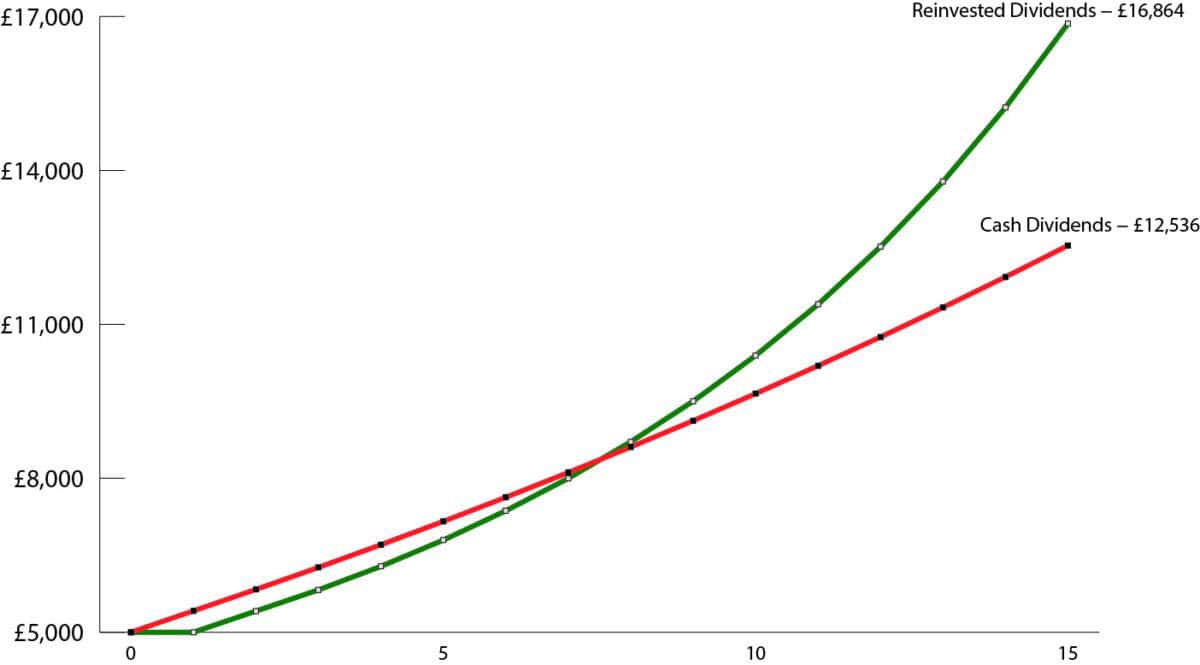Phoenix share price may be flat, but its 8.3% yield could build a strong second income


Despite limited share price progress in recent years, the Phoenix (LSE: PHNX) share price continues to reward patient investors through reliable dividends. With one of the highest yields in the FTSE 100 and a solid record of payout growth, the insurer still offers appeal for those focused on building steady passive income over time.
Steady accumulator
Over the last 10 years, the insurerâs dividends per share (DPS) have grown at a compound annual growth rate of around 3.2%.
For income chasers, I believe itâs important to use historical DPS growth as a guide when modelling future returns. A 3% annual increase in the cash cost of the dividend looks a realistic assumption.
The following chart shows how a £5,000 investment could grow over the next 15 years, assuming a flat share price.

Chart generated by author
The key takeaway is that compounding is an investorâs best friend. Reinvesting dividends to buy additional income-generating units creates an exponentially growing curve, far more powerful than the linear growth achieved by withdrawing cash each year.
Dividend sustainability
It is all well and good building a future income model, but I also need confidence that profits will keep growing to sustain those payouts.
Phoenix operates with a clear capital allocation framework, with dividend increases linked to three factors.
First, and most importantly, is operating capital generation (OCG). At H1 2025, OCG stood at £705m, of which only £274m was paid out in dividends. That leaves the business with plenty of headroom to reinvest for growth.
Second is the solvency coverage ratio, currently 175%, placing it in the upper half of its operating range. Such a high figure reflects a robust balance sheet capable of absorbing financial shocks.
Finally, distributable reserves are extremely healthy at £5.5bn, up 20% year on year.
Accounting quirk
The insurerâs H1 results highlighted that shareholdersâ equity, based on statutory accounting principles (IFRS), fell 37% to £768m. However, on an adjusted basis it came in at £3.5bn, a substantial discrepancy.
The company explained the decline as an âaccounting mismatchâ between IFRS and its preferred Solvency II framework. Under IFRS, long-term investment contracts such as annuities are valued using fixed economic assumptions, while Solvency II re-values them each period to reflect market conditions. Consequently, this can lead to vastly different valuation metrics for individual financial assets.
It may just be an accounting quirk, but if IFRS shareholdersâ equity fails to recover over time, investors may begin to question the long-term sustainability of the dividend.
Bottom line
For now, Phoenix remains one of the FTSE 100âs most reliable income plays. The share price may be static, but the dividend is well-covered, supported by strong capital generation and solid reserves.
For patient investors seeking predictable cash flow and gradual compounding, the stock is worthy of consideration, even if capital growth remains elusive.
The post Phoenix share price may be flat, but its 8.3% yield could build a strong second income appeared first on The Motley Fool UK.
Should you invest £1,000 in Phoenix Group Holdings plc right now?
When investing expert Mark Rogers has a stock tip, it can pay to listen. After all, the flagship Motley Fool Share Advisor newsletter he has run for nearly a decade has provided thousands of paying members with top stock recommendations from the UK and US markets.
And right now, Mark thinks there are 6 standout stocks that investors should consider buying. Want to see if Phoenix Group Holdings plc made the list?
More reading
- How big does an ISA pot need to be to aim for £2,000 in monthly passive income?
- £10,000 in this dividend stock may deliver a £1,784 second income in 2026 and 2027
- This blue-chip UK income stock yields a stunning 8% – can it really keep paying that?
- Everyoneâs talking about a stock market crash! Here’s what I’ll do if it happens
- £10,000 in this FTSE 100 dividend giant could make an annual passive income of £9,518!Â
Andrew Mackie has no position in any of the shares mentioned. The Motley Fool UK has no position in any of the shares mentioned. Views expressed on the companies mentioned in this article are those of the writer and therefore may differ from the official recommendations we make in our subscription services such as Share Advisor, Hidden Winners and Pro. Here at The Motley Fool we believe that considering a diverse range of insights makes us better investors.








